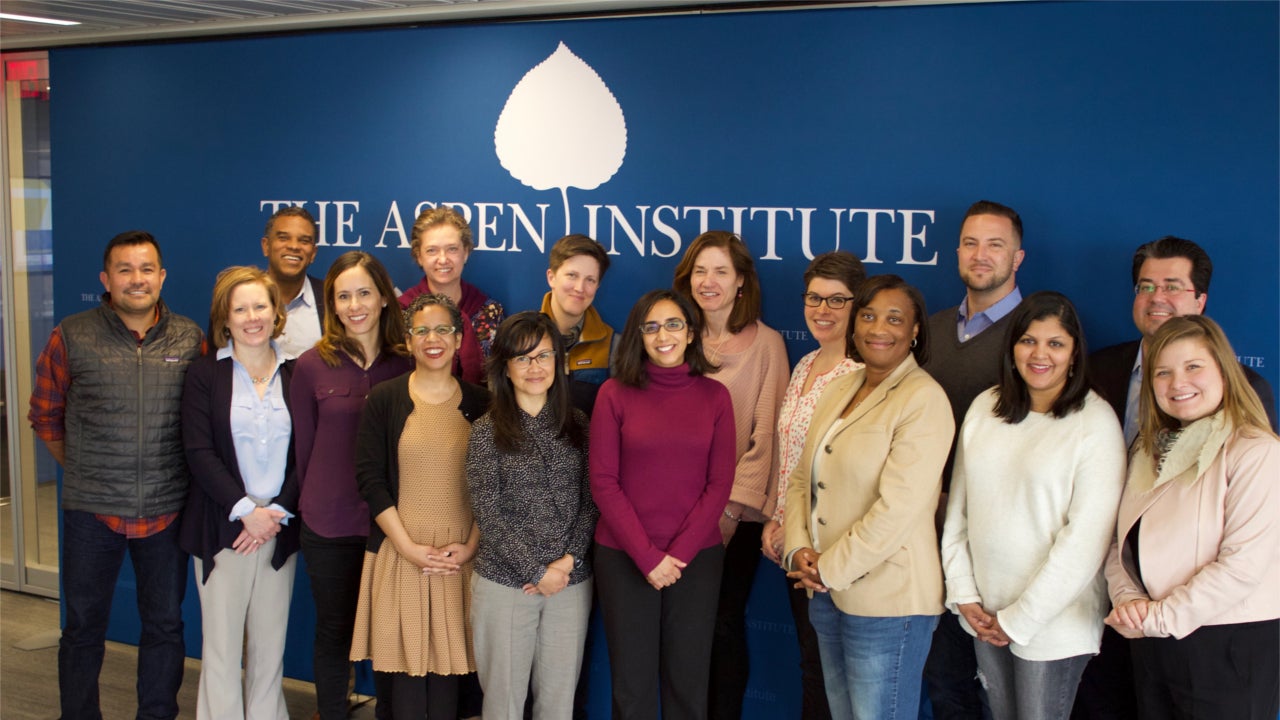Job Quality Fellow, Class of 2017-18
Chief Executive Officer, ICA Fund Good Jobs

What is the role of capital in creating quality jobs?
Capital can be an important tool not only for generating financial returns, but also for driving community outcomes. When paired with curated supports for businesses, such as business education and advising, it can be a powerful tool for creating good jobs. Taken together, these strategies can encourage a business culture that is focused not only on business growth, but also on supporting workers and communities. Ultimately, capital is a driver of the way culture is built inside a business.
My organization, ICA Fund Good Jobs, is a community development financial institution focused on using capital strategically to ensure the businesses we work with are not just creating jobs but are creating good jobs. This means jobs with good pay, good benefits, and a supportive work environment. We like to say that a good job is about choices and chances – it can help create more choices for families, setting them on a path to take more chances to improve the lives of their children and loved ones. As Oakland and the Bay Area experience rapid changes, including some of the nation’s highest annual rent increases, this work is more important now than ever before.
Tell us more about how ICA Fund Good Jobs is working to advance job quality.
At ICA Fund Good Jobs, we provide small business services to empower entrepreneurs to create good jobs and attract the capital they need to grow. Our services are focused on educating entrepreneurs, accelerating business growth, and investing in growing small businesses. Businesses that join our network begin by taking part in our educational programming, which helps us build a pipeline of good jobs creators. We expose hundreds of entrepreneurs to courses and workshops that take a pragmatic approach to business growth. We also focus on building a diverse and inclusive community of entrepreneurs. Currently, 62 percent of all companies we work with are owned by people of color, and 62 percent are owned by women.
We have learned that businesses are more likely to promote a culture of job quality when it is aligned with their goals, so we select businesses for key programs based on their commitment to creating good jobs. A subset of the businesses that enter our pipeline take part in our Good Jobs Accelerator, which connects entrepreneurs to experienced advisors and investment opportunities. The accelerator acts as a support system for established, growing small businesses that are committed to creating good jobs.
From the start, both the entrepreneurs in our network and our staff believe that good jobs are good for business. Not only do they believe in the mission, but they also recognize that good jobs can have a positive impact on a company’s bottom line by lowering turnover costs and increasing worker engagement and productivity.
What kind of results have you seen from the Good Jobs Accelerator?
In 2017, 10 businesses took part in our Good Jobs Accelerator. Using our Good Employer Matrix (GEM), we assess each business’s job quality improvements on a quarterly basis, focusing on areas such as fair pay, scheduling, and opportunities for workers to advance in their careers. GEM also allows us to track qualitative measures that sometimes aren’t immediately visible when looking at a company’s financials or assessing business performance. We use GEM data to pair businesses with advisors who have expertise at the intersection of job quality and business performance. We also link them with other entrepreneurs in our network who have experience improving specific workplace practices. GEM allows us not only to recommend the right-sized improvements in job quality based on a business’s needs, but also to help entrepreneurs determine the best times to make them.
In 2017, our Good Jobs Accelerator cohort collectively employed 303 workers and paid workers an average wage of $20.82. Eighty percent of workers in these 10 companies had access to health benefits, and the companies have grown their revenues and jobs, year over year, by 31 and 24 percent, respectively. Average annual revenue increased by $491,000 per company, and 59 new jobs were created. Through our relationships with other funders, we were also able to direct participating businesses to $6.9 million in capital to support their growth, meeting 85 percent of their combined capital need.
How does your investment strategy support good jobs?
We aim to address the “missing middle” of opportunity within the small business financing community. While opportunities exist for early-stage and proven businesses, attracting capital can be challenging for growing small businesses, which are often important drivers of job growth in our communities. We target mission-aligned small businesses that have advanced beyond early-stage financing and need small infusions of capital, particularly equity capital, as a stepping stone to higher-volume opportunities. We also view our investments as a means of connecting entrepreneurs to the network and services we provide, which support them not just in creating jobs, but creating good jobs.
Through our Seed Fund, we have directly invested $2.2 million in five Oakland-based small businesses that are committed to creating good jobs. However, the true power of our approach is our ability to leverage our investments many times over by co-investing with partners. By partnering with investors who share our values, we can steward additional capital toward the creation of good jobs. Some of our partners save space in their portfolios or provide flexible financing arrangements to businesses in our portfolio. We are proud that, for every dollar of our initial investment, Seed Fund businesses have unlocked an additional $10 in capital. That’s more than $20 million going to good-job-creating companies that otherwise struggle with securing investment. With results like these, imagine the impact an investment fund with $100 million or $1 billion could make on quality jobs.
One of the partnerships we have formed is with Signature Development Group, which prioritizes space in its portfolio for businesses in our network. As one example, in 2015, Signature co-invested alongside us to finance a new flagship baking and retail facility for Firebrand Artisan Breads. Signature also served as the landlord for the new facility, further aligning financial and mission incentives around the creation of good jobs. As sales increased, the co-owners of Firebrand rapidly doubled their staff and began setting plans for job quality improvements, including health benefits and professional development opportunities. The company was also able to focus on hiring workers with high employment need and creating internal opportunities for advancement. Today, Firebrand employs 75 workers and pays an average wage of $15.73 dollars an hour. The company has also attracted additional investors.
Firebrand’s success would not have been possible without Signature and other co-investors willing to make bets alongside ICA Fund Good Jobs and meet our businesses where they are.
What is an important lesson you have learned through your work?
As investors, we have learned that we are best positioned to advance job quality when we work with businesses to build the culture within their workplace. In the past, we experimented with incentives that would decrease interest rates if businesses met specific job quality outcomes. While we had some initial wins, we found it became less effective as businesses took on additional sources of capital. Today, we are focused on advancing job quality through long-term relationships and sustainable change anchored in our advising and support services. We have also joined the board of directors for businesses in which we have an equity stake, which gives us a voice in their governing and strategic planning discussions.
Tell us about your experience as a Job Quality Fellow.
Through the Job Quality Fellowship, I have appreciated the opportunity to come together as peers to discuss strategies that have worked and those that haven’t. In structured meetings and through back-channel conversations, we have had freedom to be vulnerable and honest about our work. I’ve benefited and learned from the different perspectives the Fellowship convenes, from fellow leaders in the small business space, to large corporate players, to the dynamic voice of one of the country’s largest labor unions.
What stands out to me most are the unique relationships I have formed and the true spirit of collaboration that the Fellowship embodies. For instance, I am currently collaborating with Christine Curella of the New York City Mayor’s Office. Christine is not only a partner through the Fellowship, but also a thought partner to ICA Fund Good Jobs as part of the Ascend network funded by JPMorgan Chase. There’s a lot of learning to be had, from coast to coast, and that’s powerful.
This work takes courage, and it’s when we sit down and candidly discuss our challenges and even failures that we begin to uncover more robust solutions.
Share now
Tweet “A good job is about choices and chances – it can help create more choices for families, setting them on a path to take more chances to improve the lives of their children and loved ones.” @seangoodjobs @ICAFundGoodJobs
Tweet “At @ICAFundGoodJobs, we provide small business services to empower entrepreneurs to create good jobs and attract the capital they need to grow.” @seangoodjobs
Tweet “By partnering with investors who share our values, we can steward additional capital toward the creation of good jobs.” @seangoodjobs @ICAFundGoodJobs
Keep in touch
Learn how the Aspen Institute Economic Opportunities Program is helping low- and moderate-income Americans connect to and thrive in a changing economy. Follow us on social media and join our mailing list to stay up-to-date on publications, blog posts, and other announcements.
We are grateful to the Ford Foundation and The Prudential Foundation for their support of this work.
